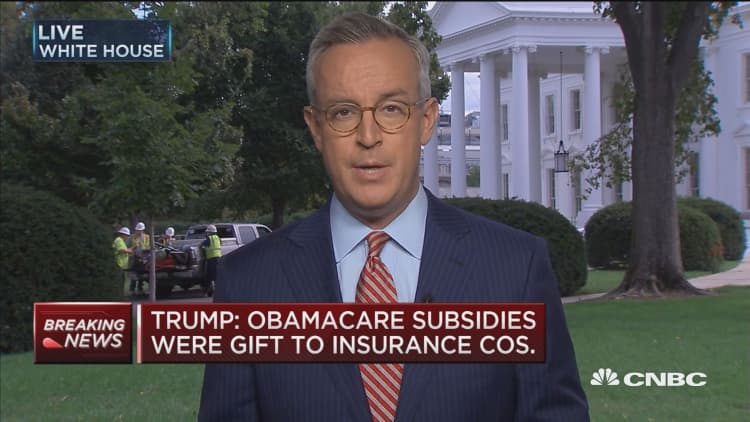A federal judge Wednesday rejected a request that he order the Trump administration to immediately resume paying Obamacare insurers key subsidies that the government cut off in recent days.
Judge Vince Chhabria's decision came after a coalition of more than a dozen states last week asked for an emergency order blocking the administration's move to cease paying the insurers.
Chhabria denied that bid two days after holding a hearing in U.S. District Court for the Northern District of California and hearing arguments from lawyers for the states and for the Trump administration.
However, the case by the states will continue in that court. And it could ultimately lead to restoration of the so-called cost-sharing reduction payments.
At the same time, a bipartisan group of U.S. senators is pushing a bill that would restore the payments to insurers.
"Although the case is at an early stage, and although it's a close question, it appears initially that the Trump administration has the stronger legal argument," Chhabria wrote in his decision.
He pointedly noted that despite the claims by the plaintiffs, most states have taken steps that will protect many consumers from the termination of the payments, in the short term.
Those steps will, in many cases, lead to consumers either not paying any more for their health plans next year than they now do, or to actually paying less.
Chhabria was appointed to his seat by President Barack Obama, who had pushed for passage of the Affordable Care Act, as Obamacare is formally known.
At issue are billions of dollars in federal payments that health insurers had received to compensate them for discounts given low-income Obamacare customers for their out-of-pocket health costs. The discounts are mandated by law and will continue, despite the loss of the reimbursements to insurers for them.
The Trump administration on Oct. 12 said it was cutting off those payments, effective last Friday, because the money for them had not been separately appropriated by Congress. President Donald Trump for months had threatened to end the payments, which had been made by the Obama administration since 2014, when Obamacare health plans first took effect.
The House in 2014 sued the Obama administration, claiming the reimbursements were illegal given the lack of congressional appropriation. A federal judge ruled in the House's favor last year, but her decision was stayed by an appeal of her ruling.
The coalition of 18 states and the District of Columbia that sued the Trump administration in an effort to restore the payments has argued that the Affordable Care Act itself authorizes the payments to be made by the government.

Many insurers have already raised their premium prices for Obamacare plans in 2018 significantly higher than they otherwise would have because of Trump's threats to end the payments.
In August, the Congressional Budget Office estimated that premium prices of individual health plans would be 25 percent higher than they otherwise would have been by 2020 if the payments were cut off.
The premium hikes would seek to make up for the loss of the reimbursements, while at the same time insurers are required by law to continue offering discounts to customers.
About 6 million low-income Obamacare customers get cost-sharing reductions for their health plans, which can significantly reduce the amount of money they have to spend on copayments, coinsurance and deductibles when getting health services and prescription medications.
Those discounts will continue, even if the insurers never get the reimbursements for their costs.
And they, and many other Obamacare customers, will be largely or completely insulated from the effect of the premium increases that insurers impose in reaction to the loss of the CSR reimbursements.
Most Obamacare customers, by having low or moderate incomes, get subsidies from the government that reduce the cost of their premiums. And the value of those subsidies rises as premiums rise.
In fact, the CBO has estimated that the federal government will actually add $194 billion to the federal deficit from the extra premium subsidies it will have to pay due to the cutoff of the CSR reimbursements to insurers.
In his written decision denying the emergency injunction that would have restored the CSR payments, Chhabria referred to that fact.
"Importantly, the emergency relief sought by the states would be counterproductive," the judge wrote. "State regulators have been working for months to prepare for the termination of these payments."
"And although you wouldn't know it from reading the states' papers in this lawsuit, the truth is that most state regulators have devised responses that give millions of lower-income people better health coverage options than they would otherwise have had."
Those responses were allowing insurers to submit proposed rates for 2018 that assumed cutoff of the CSR payments, to submit two sets of rates with one set triggered if the rates were cut off.
"This is true in almost all the states joining this lawsuit. Including California, whose regulators issued a press release just days before the suit explaining how so many lower-income people will benefit," the judge wrote.
California had imposed a surcharge of more than 12 percent on the most popular types of Obamacare plans to account for the possibility of the CSR payments ending.
WATCH: Trump says it's a disgrace that Obamacare subsidies go to insurers



